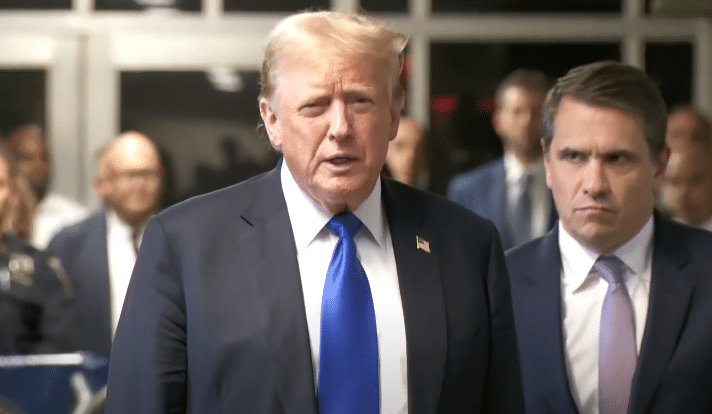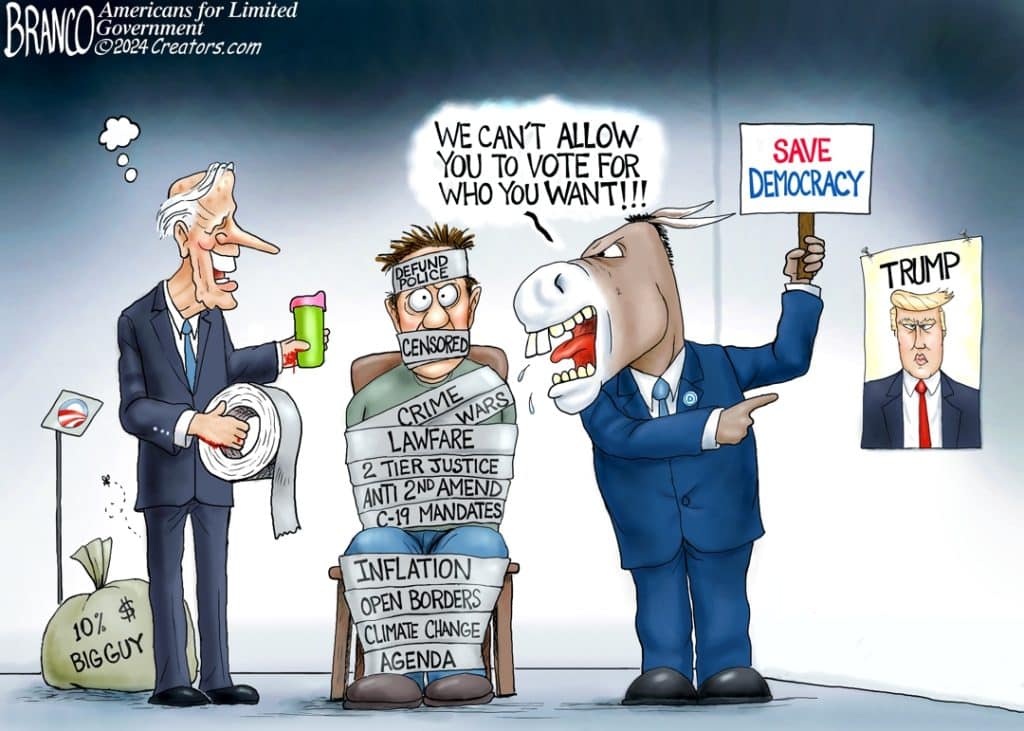June 21, 2024
Permission to republish original opeds and cartoons granted.
Missouri to sue New York over Trump conviction, but with July 11 sentencing right around the corner, time is running out
By Robert Romano
After almost a month following former President Donald Trump’s conviction by a New York City jury on May 30, Missouri Republican Attorney General Andrew Bailey announced on June 20 that his state is suing New York for its “direct attack on our democratic process through unconstitutional lawfare against President Trump”.
That’s good — better late than never — as Bailey stands as the first Republican Attorney General to actually announce such a lawsuit, with not much time before Trump’s scheduled sentencing on July 11, which could imprison to presumptive Republican presidential nominee.
Trump just swept 49 out of 50 states in the presidential primaries with a record-setting 76.4 percent of the popular vote in those primaries, the most by a non-incumbent presidential candidate in the modern history of primaries, and even more than Al Gore’s previous record of 75.8 percent of the vote in 2000 for the Democratic nomination.
And there certainly is a case to brought even at this late hour, namely, New York City and New York State appear to lack authority to enforce alleged violations of federal election law under the Supremacy Clause of Article VI of the U.S. Constitution — especially in a case that impacts every other state and their citizens' right to vote for their chosen candidate in the 2024 election.
There is no question that Missouri and other states should they join the lawsuit have original jurisdiction under Article III, Section 2 of the Constitution for “controversies between two or more states…”
It boils down to whether one state, New York, gets to determine how the 2024 election will be decided in large part based on Trump’s potential inability to campaign if he is imprisoned. Never before in U.S. history has the nominee of major party been jailed in a presidential election, let alone a former president.
Here we have Democratic prosecutors, judges and juries seeking to potentially imprison the leader of the opposition party in an election year in unprecedented fashion that threatens our civil society and poses a constitutional crisis not seen since the case of Richard Nixon.
In Nixon’s case, upon resigning the presidency in Aug. 1974, then-President Gerald Ford promptly pardoned him in Sept. 1974 for any crimes that might have been committed, warning of a vicious cycle that would ensue if Nixon were prosecuted after leaving office, calling it “an American tragedy in which we all have played a part. It could go on and on and on, or someone must write the end to it. I have concluded that only I can do that, and if I can, I must.”
Ford argued it was not possible for a former president to get a fair trial, one way or another, stating, “a former President of the United States, instead of enjoying equal treatment with any other citizen accused of violating the law, would be cruelly and excessively penalized either in preserving the presumption of his innocence or in obtaining a speedy determination of his guilt in order to repay a legal debt to society.”
With the benefit of hindsight, and with the immediate case of Trump, we can see that Ford was correct, particularly in his assessment that it is essentially impossible for a former president — and I’d argue any party nominee for that matter — to receive a fair trial particularly in a jurisdiction dominated by the opposing political party.
In a letter to all state Attorneys General on May 31, American for Limited Government President Rick Manning also noted that in addition to the unprecedented election interference posed by the Trump prosecutions, Trump’s constitutional rights were surely being violated including “unconstitutional gag orders on his First Amendment rights, but also denial of due process under both the Fifth and Fourteenth Amendments, and violations of his Sixth Amendment right to have clear charges brought before him.”
Manning added, “Since these also impact voters' rights to hear and see both candidates in the general election, state Attorneys General have a duty to preserve their franchise in the Electoral College.”
And, Manning argued, with the July 11 sentencing right around the corner, there is very little time for states to act and that there might be dire consequences if these types political prosecutions are normalized: “Failure to act by states and the Supreme Court would incentivize and perpetuate political prosecutions of presidential and other candidates for public office, with endless reprisals and show trials, effectively destroying faith in the justice system's impartiality, the rule of law, the Constitution and the civil society that the vast majority of Americans depend on. If both political parties cannot agree not to prosecute political opponents, we don't have a country.”
Manning is right, and it is up to states with a vested interest in preserving their own electoral franchises to immediately sue in the Supreme Court. With so little time, it is not even clear if doing so would be effective, but doing nothing also ensures a negative outcome, with Trump potentially being thrown in jail on July 11 ahead of even the Republican National Convention slated for July 15 to July 18. There appears to be little to gain by waiting another minute: States should sue now — before it is too late.
Robert Romano is the Vice President of Public Policy at Americans for Limited Government Foundation.
Cartoon: Killing The Republic
By A.F. Branco
Click here for a higher level resolution version.
To view online: https://dailytorch.com/2024/06/cartoon-killing-the-republic/
Urge State Attorneys General To Sue New York At U.S. Supreme Court To Stop Election Interference And Overturn Trump Conviction!
To view online: https://limitgov.salsalabs.org/free-donald-trump/index.html




